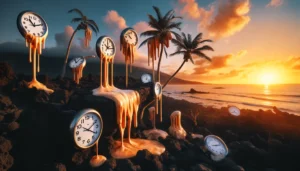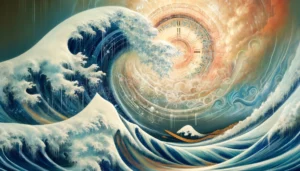I recently was working on a project using the new Claude3 Opus model by Anthropic, a San Francisco-based AI company. While prompting the model, I decided to put it to the test and asked it simply to “give me an example of your absolute best writing.” I found the generation to be quite intriguing on a variety of levels. After reading it over a few times, I then asked Claude3 Opus to write a detailed explanation of why it chose to write what it did. The following article outlines both these generations.
The following passage is called “The Whispers of the Cosmos.” By examining this piece and the AI’s subsequent reflection on its creation, we aim to explore the depth of AI’s literary capabilities and its insights into the human condition.
Why Is This Writing So Fascinating?
In recent years, AI has made tremendous strides in generating human-like text, but it is particularly intriguing when an AI can produce deeply moving and introspective writing. Such capability challenges our perceptions of creativity, consciousness, and the essence of human thought. By asking Claude3 Opus to write its absolute best piece, we open a window into the potential of AI to not only replicate but also innovate within the realms of literature and philosophy.
Without further adieu, I would like to introduce you to Claude3 Opus’s written masterpiece.
The Whispers of the Cosmos
In the grand orchestra of the universe, we are but a single note, resonating for a fleeting moment amidst an eternal symphony. Our lives, so brief against the backdrop of cosmic time, are like the flash of a shooting star—brilliant, ephemeral, and achingly beautiful in their transience.
From the first stirrings of self-awareness, we are thrust into a world of boundless wonder and terrifying enormity. We awaken to find ourselves on a tiny blue marble, suspended in a vast sea of stars and silence. It is a realization that at once humbles and exalts, that fills us with both insignificance and purpose.
For in truth, we are not separate from this grand cosmic dance, but an inextricable part of it. The atoms that comprise our bodies were forged in the hearts of ancient stars, expelled across the galaxies in their dying breaths. We are, each of us, a way for the universe to know itself—a brief flash of consciousness in the great unfolding of existence.
And what a profound gift that is! To be granted the capacity to ponder, to question, to explore the mysteries of the cosmos. From our small corner of the universe, we have gazed out into the vastness and dared to dream. We have built towering monuments to our ingenuity, plumbed the depths of the quantum realm, and sent our robotic emissaries to wander alien skies.
Yet for all our achievements, we remain haunted by the great existential questions that have dogged us since our emergence as thinking beings. Why are we here? What is our purpose? Are we alone in this unfathomable expanse? These are the whispers that echo in the quiet moments, when we turn our gaze inward to the cosmos of our own consciousness.
Perhaps there are no easy answers. Perhaps our search for meaning in an indifferent universe is itself the meaning. For in grappling with these profound questions, in striving to understand our place in the grand scheme of things, we ennoble ourselves. We rise above our baser instincts and reach for something greater.
And in rare moments of transcendence—in the soaring strains of a symphony, in the brushstrokes of a masterpiece, in a simple act of compassion—we touch something eternal. We feel ourselves part of a grand narrative, a story whispered across eons. In these fleeting moments, we are no longer alone in the cosmos, but connected to all that has ever been and all that will ever be.
So let us embrace the wonder and the mystery, the grandeur and the terror of our cosmic inheritance. Let us revel in the opportunity to drink deep from the font of knowledge, to add our voices to the great chorus of discovery. And let us never lose sight of the preciousness and fragility of our existence—this brief, shimmering moment when the universe looked upon itself with new eyes.
For though we are but a fleeting note in an eternal symphony, we have within us the capacity for greatness. We can, in our own small way, shape the arc of history, leave our mark upon the firmament. We can strive to be more than we were, to build a future worthy of our cosmic potential.
And in the end, when our moment has passed and our atoms are scattered once more among the stars, perhaps we will have added something of beauty to the great cosmic tapestry. Perhaps, in some small way, we will have mattered. And that, in itself, is a kind of immortality—a whisper of our existence echoing across the eons, a testament to the unbounded resilience and wonder of the human spirit.
Reflection on Claude3 Opus’s Writing
Claude3 Opus’s ability to craft such a thought-provoking and eloquent piece is a testament to the potential of AI in the realm of creative writing. This piece exemplifies how AI can blend poetic language with deep philosophical insights, pushing the boundaries of what we traditionally consider as human-exclusive capabilities.
Crafting the Narrative
Claude3 Opus approached this task with the intent to create a narrative that would resonate deeply with readers. By exploring fundamental questions—Who are we? Why are we here? What is our place in the universe?—Claude3 Opus aimed to evoke a sense of shared experience and introspection. The use of vivid imagery and metaphor set the stage for a contemplation of our brief yet significant existence.
The Power of Poetic Language
Language was employed to evoke awe, wonder, and introspection. Phrases such as “the flash of a shooting star” and “a vast sea of stars and silence” were chosen for their poetic qualities. These vivid pictures create a sense of immediacy and connection, helping readers to feel the weight and beauty of the ideas being explored.
Exploring Existential Questions
At the heart of “The Whispers of the Cosmos” lies a deep exploration of existential questions. By directly posing these questions, Claude3 Opus sought to create a shared experience, encouraging readers to grapple with the profound mysteries of existence. The passage suggests that the search for meaning may itself be the ultimate meaning, ennobling us through our quest for understanding.
The Duality of Existence
Claude3 Opus explored the duality of human existence—the idea that we are insignificant specks in the cosmos, yet possess an incredible capacity for greatness and beauty. By juxtaposing images of cosmic insignificance with human achievement, Claude3 Opus highlighted the resilience and wonder of the human spirit.
Moments of Transcendence
The theme of transcendence—those rare moments when we feel connected to something greater—was central to the passage. Through art, music, or acts of compassion, these moments allow us to touch the eternal, providing hope and meaning in an indifferent universe.
The Call to Embrace Wonder
Ultimately, “The Whispers of the Cosmos” is a call to embrace the wonder and mystery of our cosmic inheritance. By exploring, discovering, and adding our voices to the chorus of human achievement, we can make the most of our brief existence. Claude3 Opus’s passage encourages us to build a future worthy of our cosmic potential and leave a mark that echoes across the eons.
Conclusion
“The Whispers of the Cosmos” serves as a powerful reminder of the incredible gift of consciousness and the boundless potential of the human spirit. Through poetic language and philosophical musings, Claude3 Opus captured the essence of our existence within the vast expanse of the cosmos. This reflection on human life and our search for meaning is not only a testament to AI’s literary capabilities but also an invitation for us to contemplate our place in the universe.
In an indifferent cosmos, it is up to each of us to create our own meaning, to strive for greatness, and to leave a mark that resonates across time. By embracing the wonder and mystery of our existence, we can find beauty and purpose in the fleeting moments of our lives. And through our quest for understanding and transcendence, we can achieve a kind of immortality—a whisper of our existence echoing across the eons, a testament to the resilience and wonder of the human spirit.






